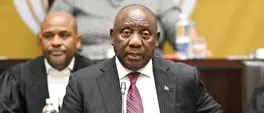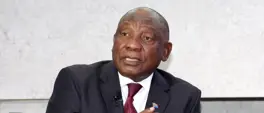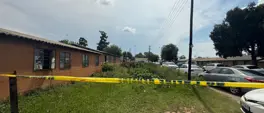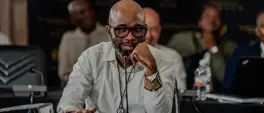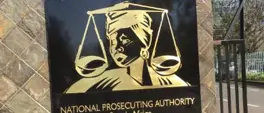JUDITH FEBRUARY: Blaming ‘the other’ and xenophobic complacency in govt a convenient norm
Judith February
26 November 2024 | 13:01Our country has a vile history of xenophobia, and our politicians are well-versed in exploiting grievance. But as with everything else in South Africa, the reasons for violence are complex, writes Judith February.
In 2022, Phophi Ramathuba stood at the bed of a Zimbabwean patient who had been involved in a car accident, in a hospital in Bela-Bela, Limpopo, and said: “You are killing my (sic) health system.”
Ramathuba was MEC of Health at the time. It was a shameful scene, and even while the cameras rolled, Ramathuba showed very little care.
When these words were followed by an outcry, Ramathuba insisted she would not apologise.
Defiant and callous and after the May election, Ramathuba was elevated to Premier of Limpopo. So, xenophobia pays, it seems. But not for the first time in our politics.
These past two weeks, we have witnessed a most abhorrent act as illegal miners are trapped inside a mine in Stilfontein with no help forthcoming as a human tragedy unfolds in real-time.
The response from Minister in the Presidency, Khumbudzo Ntshavheni, made national and international headlines when she said, stone-cold: ‘"You want to send our law enforcement officers to risk because criminals want to destroy our country? What if we send the police or military down there to supply them with food, the place explodes and caves in, what will happen? So families must continue to sacrifice because criminals got themselves into a bind?"
It ran on, with Ntshavheni saying the government would not send help.
“We will smoke them out”, she said, without understanding how objectionable her words were.
What a disgrace. As usual, the President was silent in the face of the comments. But it is not the first time this minister has found her foot in her mouth.
Earlier this year, she lambasted ‘business’ for having no interest in the development of our country - even as the President was working alongside business in several fora.
Quite why she seems to have the President’s ear is unclear. She is unwise and in general an unhelpful interlocutor. But the African National Congress (ANC) has never been about putting the best people in the right jobs, so the question remains rhetorical.
And dangerous xenophobia and casual xenophobic talk is not new either. This is who we have now become - a country where a weak and ineffective government uses foreigners as an excuse for its pitiable governance. How very convenient.
Inside Ramaphosa’s Cabinet is Gayton McKenzie whose entire political strategy is based on fomenting division and hate for foreigners. As district mayor in Beaufort West, McKenzie vowed to make the Central Karoo an “illegal immigrant-free zone”, sending shivers down the spines of the Bangladeshi, Pakistani and Ethiopian communities.
When McKenzie was appointed to Cabinet, he was cheered on social media for his jovial banter and ‘get fit’ programme.
So we should not be surprised. Our country has a vile history of xenophobia and our politicians are well-versed in exploiting grievance.
Operation Dudula is an example. It gained prominence on the streets, especially after its leader, Nhlanhla “Lux” Dlamini, was arrested in 2022. Operation Dudula brought with it violent language and has enticed those at the margins of our society with its easy thinking and facile solutions to complex problems of unemployment and inequality.
The intricate links it has forged with certain politicians were almost inevitable.
Our inner cities and towns have long been places with discontent simmering at the surface. Yet, in the typically South African way, we have chosen to ignore the degradation and depravity. We have seen xenophobic violence spread to Johannesburg and further afield at various intervals.
Truck drivers routinely “protest” against the hiring of foreign drivers. We also remember 2008 as a frightening time when the “Burning Man” covered the front pages of local and international newspapers.
Ernesto Nhamuave, a 35-year-old Mozambican, was burnt alive during xenophobic violence on the East Rand in May 2008, violence that spread across the country. Of course, many in government refused to call it xenophobia. That seemed and often still seems a step too far.
In 2015, the streets of Durban and the surrounding townships were seething with anger and violence as foreigners and locals battled it out. The government finally stepped in to prevent a bloodbath in Durban, yet its response was largely reactive. Then, the late King Goodwill Zwelethini was quoted as saying all foreigners should return to the places they came from. At the time, the government refused to speak out against these blatantly inciteful comments and the king himself blamed the media for misinterpreting what he said.
As with everything else in South Africa, the reasons for violence are complex.
Sometimes it has been driven by xenophobia, and at other times a rather more confusing cocktail of anger, frustration and intolerance bubbling at the surface of our society. Fuelled by exclusion, poverty and rampant unemployment, the environment is ripe for blaming “the other” while competing for scarce resources.
At the heart of the incendiary rhetoric lies populist exploitation and an instinct to simplify the complex. This is not unique to South Africa. We have seen it in Donald Trump’s presidency and recent re-election campaign and the arguments for Brexit.
What a shame that Ramaphosa has not fired Ntshaveni for her comments and, as usual, he himself has been silent.
But then, we are still waiting for him to apply his mind to the issue of Justice and Constitutional Development Minister Thembi Simelane, whose position is so obviously untenable given the still unanswered questions relating to a loan of over R500,000 from a company that had brokered unlawful investments into the since-collapsed VBS Mutual Bank at a time when the minister was the mayor of the Polokwane municipality.
The story broke in late August and nothing meaningful has happened since.
But it is a sign of the impunity and shamelessness which pervades our society, that all manner of grifters simply live as if there are no consequences to their words or indeed their actions. Because mostly, there are not.
Judith February is Freedom Under Law's executive officer.
Get the whole picture 💡
Take a look at the topic timeline for all related articles.




